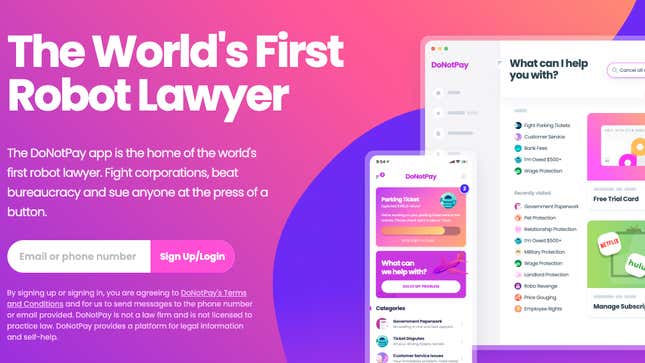
An AI-based legal advisor is set to play the role of a lawyer in an actual court case for the first time. Via an earpiece, the artificial intelligence will coach a courtroom defendant on what to say to get out of the associated fines and consequences of a speeding charge, company DoNotPay has claimed in a report initially from New Scientist and confirmed by Gizmodo.
The in-person speeding ticket hearing is scheduled to take place in a U.S. courtroom (specifically, not California) sometime in February, DoNotPay’s founder and CEO Joshua Browder told Gizmodo in a phone call. However, Browder said he wouldn’t provide any further case details to protect the defendant’s privacy.
DoNotPay is also reticent to disclose case specifics because what they’re doing is likely in violation of courtroom laws and protocol. In many countries and jurisdictions around the world, phones and internet connected devices are banned from courts. To get around restrictions on phone usage, Browder explained to Gizmodo that the company is relying on hearing accessibility standards in this particular court, which offer a loophole allowing the use of Apple AirPods. Asked if the court will be aware of the AI-assistance during the hearing, Browder responded, “Definitely not.”
The CEO said the company is also working with another U.S.-based speeding ticket defendant in a case that will go to Zoom trial. In that instance, DoNotPay is weighing the use of a teleprompter vs. a synthetic voice—the latter strategy Browder described as “highly illegal.” But he’s not too concerned about legal repercussions because “at the end of the day, it’s a traffic ticket.” Browder doesn’t expect courts to come down hard on speeding defendants over AI-coaching, and the law doesn’t have explicit provisions in it barring AI-legal assistance. Plus, “it’s an experiment and we like to take risks,” he added.
However, DoNotPay does plan to take responsibility for any resulting fines from both cases, and Browder said that the company is compensating the two defendants for their participation in the “experiment.” He also claimed that the company has trained its AI extensively to not lie or stray beyond provided facts, hopefully eliminating the possibility of a courtroom perjury charge.
DoNotPay was started in 2015 as a basic chatbot, meant to help users navigate bureaucratic and legal snafus—mostly using conversation templates. And even in its earliest incarnations, the bot was a success. In less than two years, DoNotPay said it successfully contested 160,000 parking tickets in New York and London. And the company claims it has resolved 2 million cases total since its founding. Then, in 2020, with the release of ChatGPT, the company shifted its research and development focus to AI and upped its potential.
More recently, DoNotPay has gotten attention for its corporate negotiation tactics. In a video posted to his Twitter account, Browder demonstrated knocking $10 off of a monthly internet bill using the ChatGPT-powered bot. The founder also told New Scientist that he recently used the AI and a synthesized voice to reverse $16 worth of bank fees. And these are the types of use cases where Browder imagines DoNotPay being most applicable for the public in the immediate future, though he told New Scientist his goal is for the AI to eventually supplant some lawyers entirely.
The company already offers non-AI template tools on its site that can produce written communication or scripts for people looking to avoid or minimize fines, healthcare costs, subscriptions, or other common bureaucratic speed bumps of modern life. For now though, at least, the courtroom shenanigans are just a “proof of concept to try to encourage courts to embrace technology and allow people to access justice,” he said.
“We help consumers fight corporations and beat bureaucracy, getting them out of parking tickets and refunds from big companies like airlines...our vision at DoNotPay is to make the law free,” Browder says in a promotional video for the company. But we’ll have to wait until the end of February to know if that lofty vision successfully translates to the courtroom. Browder said the company will disclose details of both the Zoom and in-person cases following their conclusion.